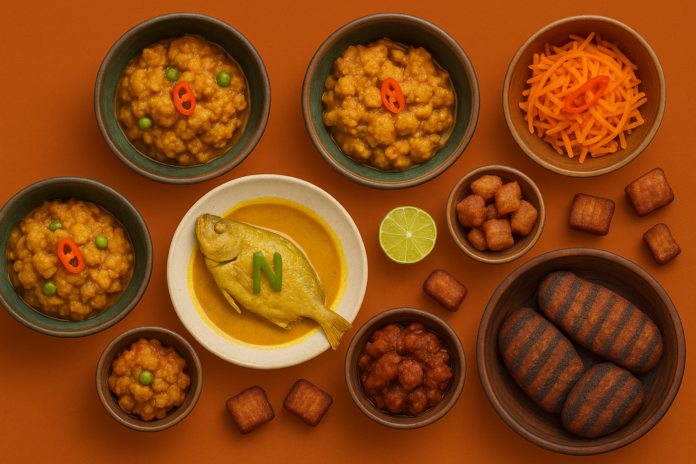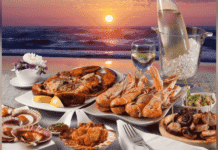Living in Shri Vijaya Puram, you understand that the Andaman and Nicobar Islands are not just a destination but a world apart. Out here, life unfolds at a different pace. The air smells of salt and mango leaf, and the sea is never too far away. But for those of us who have spent years watching the tides rise and fall, the real secret of the islands lies not just in their waters, but in their kitchens.
Particularly, the kitchens of the Nicobarese.
The Nicobarese are a gentle, dignified people, residents of the Nicobar group of islands to the south. Unlike some other cultures, they do not display their traditions for show. Their language is soft, their ways understated. They are not keen on fanfare or festivals that attract attention. Perhaps that is why so few visitors ever truly encounter the depth and delicacy of Nicobari cuisine.
Let me be clear: there are no hotels or restaurants that serve native Nicobari food. No menus will list “wild boar curry” or “bamboo-cooked seafood.” These dishes are not for sale. They are expressions of home and hospitality. The only way to taste them is to be invited to sit cross-legged in a Nicobari home, often under a sloping tin roof, and eat with your hands from a shared platter.
But the good news? It’s easier than you think to be invited. Nicobarese friendships begin quietly with a shared smile, a helping hand, and a question answered kindly. And once that bond is made, it lasts. They are among the most affable, sincere people I’ve met in the islands, and it is this very nature that opens the door, not just to their homes, but to their hearts and their kitchens.
Here are some of the unforgettable dishes you might encounter, should you be fortunate enough to be welcomed into one of those homes:
Nicobari Fish Biryani
Not your usual biryani. No heavy spices, no rich oils. This one is gentle, scented with pandan leaves and curry leaf, built around fresh reef fish marinated in coconut milk. The rice is short-grain, often locally grown, and the whole thing is slow-cooked in banana leaves or sealed earthen pots. You won’t find it in any market. It appears only during weddings, harvests, or when a guest arrives from far away.
Coconut Crab Curry
This is a dish of reverence. Made with the now-protected coconut crab when it is made at all, it is rich and deep, simmered in roasted spices, coconut milk, and green chilies. These days, locals wisely substitute it with mud crabs, which soak up the curry just as beautifully. Either way, the result is a bowl that smells of the sea and speaks of memory.
Yam and Coconut Stew
Cooked often during the monsoon months, this vegan dish is a marvel of simplicity. Yams are softened, then folded into a broth of turmeric, mustard seed, curry leaves, and creamy coconut milk. It’s hearty and soothing, like a story passed down over generations, quiet, nourishing, familiar.
Bamboo-Cooked Seafood
There are no stoves involved here. Just fresh fish or prawns, wild herbs, hollow bamboo, and an open fire. The bamboo keeps the juices in, steams the seafood gently, and adds a flavor that no kitchen can replicate. It’s usually cooked on forest treks or coastal picnics, not for occasions but for the sheer joy of it.
Wild Boar Curry
This dish is steeped in ceremony. The boar is hunted with care, never in excess, and marinated in garlic, vinegar, and native herbs. Then it’s slow-cooked in a rich gravy with green bananas and root vegetables. You’ll eat it only on the most special days, and you’ll remember it for the rest of your life.
Pandanus Fruit Pudding
From the towering kekaruk trees comes the pandanus fruit, strange-looking, fragrant, and full of healing properties. Boiled, mashed, and sweetened with coconut sugar, it’s transformed into a soft pudding, sometimes with coconut cream on top. It’s a dessert, yes, but also a piece of cultural wisdom.
Haik Tea
Every culture has its comfort drink. For the Nicobarese, it is Haik Tea, a herbal infusion made with lemongrass, ginger, basil, and pandan leaves. Sometimes sweetened with wild honey. Served warm in coconut shells, it’s both a healing tonic and a way of saying, You’re welcome here.
There is a strength in this quiet food. It does not shout. It does not sell. It simply is rooted in land, sea, and the kindness of those who prepare it. So if you ever come to these islands, come with patience and an open heart. Don’t look for Nicobari cuisine on TripAdvisor or behind glass counters.
Look instead for a friend. All it takes is one. And if you’re lucky, if you’re invited, you’ll find yourself in the middle of a meal that isn’t just unforgettable, but nearly sacred.
And that, more than anything, is the real flavor of the Nicobars.





